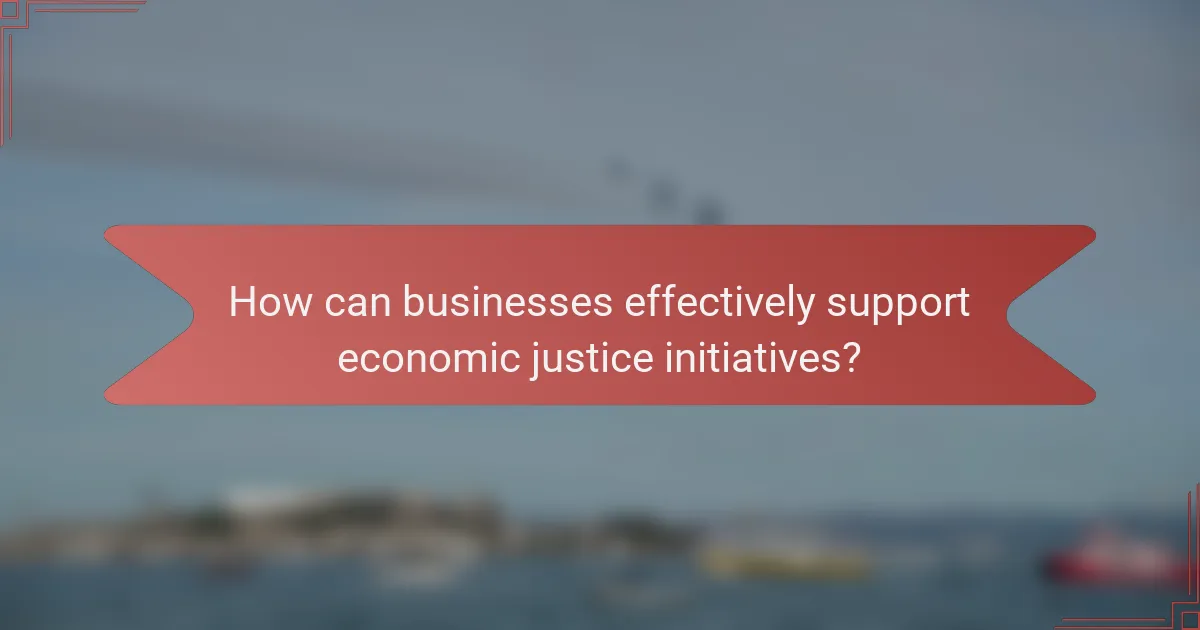
What is the Economic Impact of BLM Protests?
The economic impact of BLM protests includes both short-term disruptions and long-term changes in business practices. Protests often lead to temporary closures and reduced sales for local businesses. For instance, during the peak of protests in 2020, many retailers reported significant losses due to vandalism and looting.
In contrast, BLM protests have prompted some companies to reevaluate their policies and practices. Many businesses increased investments in diversity and inclusion initiatives. A survey by McKinsey found that 67% of companies planned to enhance their diversity efforts as a direct response to the protests.
Additionally, some cities experienced increased funding for community programs aimed at addressing racial inequality. This funding can stimulate local economies by creating jobs and supporting small businesses. Overall, while the immediate financial impact can be negative, the long-term effects may lead to positive changes in economic justice and corporate responsibility.
How do BLM protests influence local economies?
BLM protests can influence local economies by leading to both short-term disruptions and long-term changes. These protests often result in temporary business closures, which can decrease local revenue. For instance, during the protests in 2020, many retail establishments faced reduced foot traffic and operational hours.
However, BLM protests can also stimulate local economies by increasing awareness and support for minority-owned businesses. Research shows that communities may rally to support these businesses in response to social movements. Additionally, protests can prompt local governments to allocate funds for economic justice initiatives, enhancing community investment.
Overall, the influence of BLM protests on local economies is multifaceted, involving both negative impacts from disruptions and potential positive outcomes through community support and policy changes.
What are the short-term economic effects of BLM protests?
The short-term economic effects of BLM protests include disruptions to local businesses and fluctuations in consumer spending. Protests often lead to temporary closures and reduced foot traffic in affected areas. According to a report from the National Bureau of Economic Research, businesses in protest-impacted locations experienced a decline in sales of up to 30%. Additionally, some businesses faced increased costs due to property damage or heightened security measures. The protests also prompted shifts in consumer behavior, with some individuals choosing to support local businesses that align with social justice values. Overall, these protests have immediate financial implications for businesses and the broader economy.
How do BLM protests affect long-term economic growth?
BLM protests can negatively impact long-term economic growth by disrupting business operations. These protests often lead to temporary closures and reduced consumer spending in affected areas. According to a study by the National Bureau of Economic Research, cities experiencing significant protests saw a decline in local economic activity. The study indicated that businesses faced increased costs due to property damage and heightened security measures. Additionally, uncertainty from social unrest can deter investment in these regions. Over time, this may lead to slower job creation and reduced economic development. Thus, while the protests aim for social justice, they may inadvertently hinder economic growth in the long term.
What role do businesses play during BLM protests?
Businesses play a significant role during BLM protests by publicly supporting racial justice initiatives. Many companies have issued statements condemning racism and expressing solidarity with the movement. For example, in 2020, over 1,000 businesses pledged to support Black Lives Matter through various initiatives. Businesses also contribute financially to organizations advocating for racial equality. In 2020, corporate donations exceeded $1 billion to social justice causes. Additionally, some companies have implemented internal changes to promote diversity and inclusion. This includes hiring practices aimed at increasing representation of marginalized communities. Overall, businesses can influence public perception and drive social change through their actions and commitments during BLM protests.
How do businesses respond to BLM protests?
Businesses respond to BLM protests by publicly supporting racial justice initiatives. Many companies issue statements condemning racism and promoting equality. Some engage in financial contributions to organizations advocating for social justice. For instance, in 2020, major corporations donated over $1 billion to various racial equity initiatives. Businesses also implement internal changes, such as diversity training and hiring practices aimed at increasing representation. Additionally, some companies participate in community engagement efforts to foster dialogue around racial issues. These actions reflect a growing recognition of the importance of corporate social responsibility in addressing systemic racism.
What are the implications of business responses on community relations?
Business responses significantly impact community relations. Positive actions can enhance trust and collaboration. For example, companies that support local initiatives often see improved public perception. Conversely, negative responses can lead to community backlash. A study by the Harvard Business Review found that businesses perceived as unresponsive to social issues face decreased customer loyalty. Additionally, transparent communication fosters stronger relationships. Engaging with community leaders during crises can also mitigate tensions. Overall, business responses shape community dynamics and can either strengthen or weaken ties.
What funding initiatives have emerged from BLM protests?
Funding initiatives that emerged from BLM protests include the establishment of various grant programs and funds aimed at supporting Black-owned businesses and community organizations. Notable initiatives include the “Black Business Relief Fund,” which raised millions to assist businesses affected by protests and the pandemic. Additionally, the “George Floyd Memorial Fund” was created to support social justice organizations. Corporations like Amazon and Starbucks pledged significant financial support to initiatives focused on racial equity. These funding efforts aim to address economic disparities and promote social justice in the wake of the protests.
How are funds allocated to support economic justice initiatives?
Funds are allocated to support economic justice initiatives through various channels. Nonprofit organizations often receive grants from foundations dedicated to social equity. Government programs also provide financial resources aimed at addressing systemic inequalities. Corporations may contribute through corporate social responsibility initiatives. Community-based organizations often manage local funds for direct support. Crowdfunding platforms enable individuals to donate directly to specific projects. Research shows that targeted funding can lead to measurable improvements in marginalized communities. For example, the Ford Foundation committed $1 billion to address racial injustice and economic disparities.
What types of organizations are involved in funding efforts?
Various organizations are involved in funding efforts related to economic justice initiatives. These include non-profit organizations, foundations, and corporate sponsors. Non-profit organizations often focus on social justice and community development. Foundations may provide grants to support specific projects. Corporate sponsors can contribute funds as part of their corporate social responsibility initiatives. Government agencies also play a role by offering grants and subsidies for related efforts. Additionally, grassroots movements may engage in fundraising to support their causes. These funding efforts are essential to promote economic equity and support communities impacted by systemic injustice.

What are the key economic justice initiatives related to BLM protests?
Key economic justice initiatives related to BLM protests include the push for reparations, equitable funding for Black-owned businesses, and support for community investment programs. Reparations initiatives aim to address historical injustices by providing financial compensation or resources to Black communities. Funding for Black-owned businesses has increased, with initiatives like the “Black Business Relief Fund” providing grants and loans. Community investment programs focus on enhancing economic opportunities in marginalized neighborhoods. These initiatives are rooted in the demand for systemic change and economic equity. They reflect a broader movement to dismantle structural racism in economic systems.
How do economic justice initiatives aim to address inequality?
Economic justice initiatives aim to address inequality by promoting equitable access to resources and opportunities. These initiatives focus on dismantling systemic barriers that disproportionately affect marginalized communities. They advocate for policy changes that enhance economic mobility, such as fair wages and affordable housing. Programs often provide financial education and support for minority-owned businesses. Research indicates that such initiatives can reduce wealth gaps and improve community well-being. For example, the Economic Policy Institute highlights that raising the minimum wage can significantly benefit low-income workers. By addressing these disparities, economic justice initiatives foster a more inclusive economy.
What are the primary goals of these economic justice initiatives?
The primary goals of economic justice initiatives include reducing income inequality and promoting equitable access to resources. These initiatives aim to address systemic barriers faced by marginalized communities. They seek to create fair employment opportunities and enhance economic mobility. Additionally, these initiatives focus on increasing investment in underserved areas. They promote policies that support wealth-building for low-income individuals. The initiatives also advocate for fair wages and benefits across industries. By addressing these goals, economic justice initiatives strive to create a more just and inclusive economy.
How do these initiatives promote community development?
These initiatives promote community development by fostering economic opportunities and social equity. They support local businesses through funding and resources, enabling growth and job creation. Initiatives often focus on marginalized communities, addressing systemic inequalities. By enhancing access to education and training, they empower residents with skills for better employment. Furthermore, they encourage civic engagement and community participation, strengthening social bonds. Studies show that such initiatives can lead to improved community well-being and resilience. For example, the Economic Policy Institute highlights that targeted investments in underserved areas can significantly boost local economies.
What challenges do economic justice initiatives face?
Economic justice initiatives face several significant challenges. These include systemic inequality that hinders access to resources. Additionally, funding limitations restrict the scale of initiatives. Political opposition often undermines policy changes necessary for economic justice. Public awareness and engagement can be insufficient, leading to a lack of support. Moreover, there are complexities in measuring the impact of these initiatives. These factors collectively impede the effectiveness of economic justice efforts.
What barriers hinder the effectiveness of these initiatives?
Barriers hindering the effectiveness of economic justice initiatives include lack of funding, insufficient community engagement, and systemic inequality. Limited financial resources restrict the scope and reach of initiatives. Many organizations struggle to secure sustainable funding, which impacts their long-term viability. Additionally, inadequate involvement from affected communities can lead to initiatives that do not address their specific needs. This disconnect often results in a lack of trust and support from the very communities these initiatives aim to assist. Systemic inequality further complicates efforts, as entrenched social and economic disparities can undermine the effectiveness of proposed solutions. Research shows that initiatives lacking comprehensive community input often fail to achieve desired outcomes, emphasizing the need for inclusive approaches.
How can businesses overcome these challenges to support initiatives?
Businesses can overcome challenges to support initiatives by implementing strategic partnerships. Collaborating with community organizations enhances outreach and impact. Allocating resources effectively ensures initiatives are well-funded and sustainable. Training employees on diversity and inclusion fosters a supportive culture. Establishing clear communication channels aids in addressing concerns quickly. Tracking progress through measurable goals demonstrates commitment and accountability. Research shows that businesses with strong community ties report higher customer loyalty. Data from the Stanford Social Innovation Review indicates that engaged businesses improve their overall performance.

How can businesses effectively support economic justice initiatives?
Businesses can effectively support economic justice initiatives by implementing fair hiring practices and equitable pay. This includes actively recruiting from underrepresented communities. Providing training and mentorship programs enhances workforce diversity. Additionally, businesses can invest in local economies through community development projects. Supporting minority-owned businesses through partnerships and procurement helps create economic opportunities. Companies can also advocate for policy changes that promote economic equity. Research shows that businesses engaging in these practices contribute to a more just economy. For instance, a study by the Aspen Institute highlights the positive impact of corporate diversity initiatives on economic growth.
What best practices should businesses adopt for meaningful engagement?
Businesses should adopt transparency, active listening, and community involvement for meaningful engagement. Transparency builds trust and fosters open communication. Active listening allows businesses to understand community needs and concerns. Community involvement demonstrates commitment to social issues and creates stronger relationships. Research shows that companies engaging in social responsibility positively impact their reputation and customer loyalty. According to a 2020 study by Cone Communications, 76% of consumers expect companies to take a stand on social issues.
How can businesses measure the impact of their contributions?
Businesses can measure the impact of their contributions through various metrics and evaluation methods. They can track financial donations and analyze changes in community economic indicators. Surveys can assess community sentiment and perceived benefits of contributions. Businesses can also evaluate employee engagement and retention rates after implementing social initiatives. Data analytics can provide insights into changes in customer loyalty and brand perception. Additionally, partnerships with local organizations can yield qualitative feedback on impact. Research shows that businesses engaging in social responsibility often see a positive correlation with financial performance.
What partnerships can enhance business involvement in economic justice?
Partnerships with community organizations can enhance business involvement in economic justice. Collaborating with local nonprofits allows businesses to understand community needs better. These organizations often have established relationships and trust within the community. Businesses can also partner with educational institutions to promote workforce development. Such partnerships can create training programs that empower marginalized groups. Additionally, alliances with government agencies can facilitate access to funding and resources. For example, the Economic Development Administration provides grants that support equitable economic initiatives. Engaging in these partnerships can lead to sustainable economic growth and social equity.
What lessons can be learned from the economic impact of BLM protests?
The economic impact of BLM protests highlights the importance of corporate social responsibility. Companies that supported the movement saw increased customer loyalty. For instance, a 2020 survey indicated that 60% of consumers preferred brands that took a stand on social issues. Economic data shows that businesses in supportive communities experienced a boost in sales. Conversely, companies that remained silent faced backlash and lost market share. The protests also underscored the need for equitable funding in marginalized communities. Investment in economic justice initiatives can lead to long-term benefits for both businesses and society. These lessons emphasize the alignment of ethical practices with economic success.
How can these lessons inform future business strategies?
Lessons from the BLM protests can significantly shape future business strategies. Businesses can adopt more inclusive practices to address social justice issues. Companies that actively engage with their communities can build stronger brand loyalty. Data shows that 70% of consumers prefer brands that take a stand on social issues. This indicates a market shift towards corporate social responsibility. Additionally, businesses can enhance their diversity initiatives to reflect broader societal values. Research shows diverse teams are 35% more likely to outperform their competitors. By integrating these lessons, companies can create sustainable growth and foster positive community relations.
What role does community feedback play in shaping business responses?
Community feedback significantly influences business responses by guiding decision-making and strategy adjustments. Businesses often analyze feedback to understand community needs and preferences. This feedback can come from surveys, social media, or direct communication. For instance, during the BLM protests, many companies adjusted their policies based on public sentiment. A 2020 survey indicated that 76% of consumers expected brands to take a stand on social issues. Companies that aligned their responses with community expectations saw increased customer loyalty and trust. Thus, community feedback serves as a critical tool for businesses to remain relevant and responsive.
The main entity of the article is the economic impact of Black Lives Matter (BLM) protests, focusing on business responses, funding initiatives, and economic justice initiatives. The article outlines the short-term disruptions caused by protests, such as temporary business closures and reduced sales, alongside long-term shifts in corporate practices towards diversity and inclusion. It highlights the role of businesses in supporting racial justice initiatives and the emergence of funding programs aimed at assisting marginalized communities. Additionally, the article discusses the challenges faced by economic justice initiatives and the importance of community feedback in shaping effective business responses.